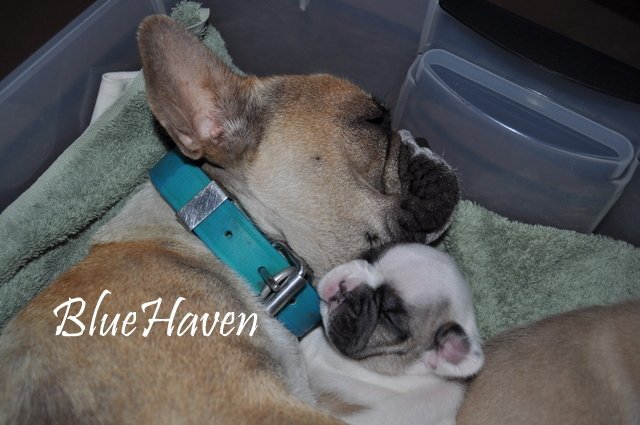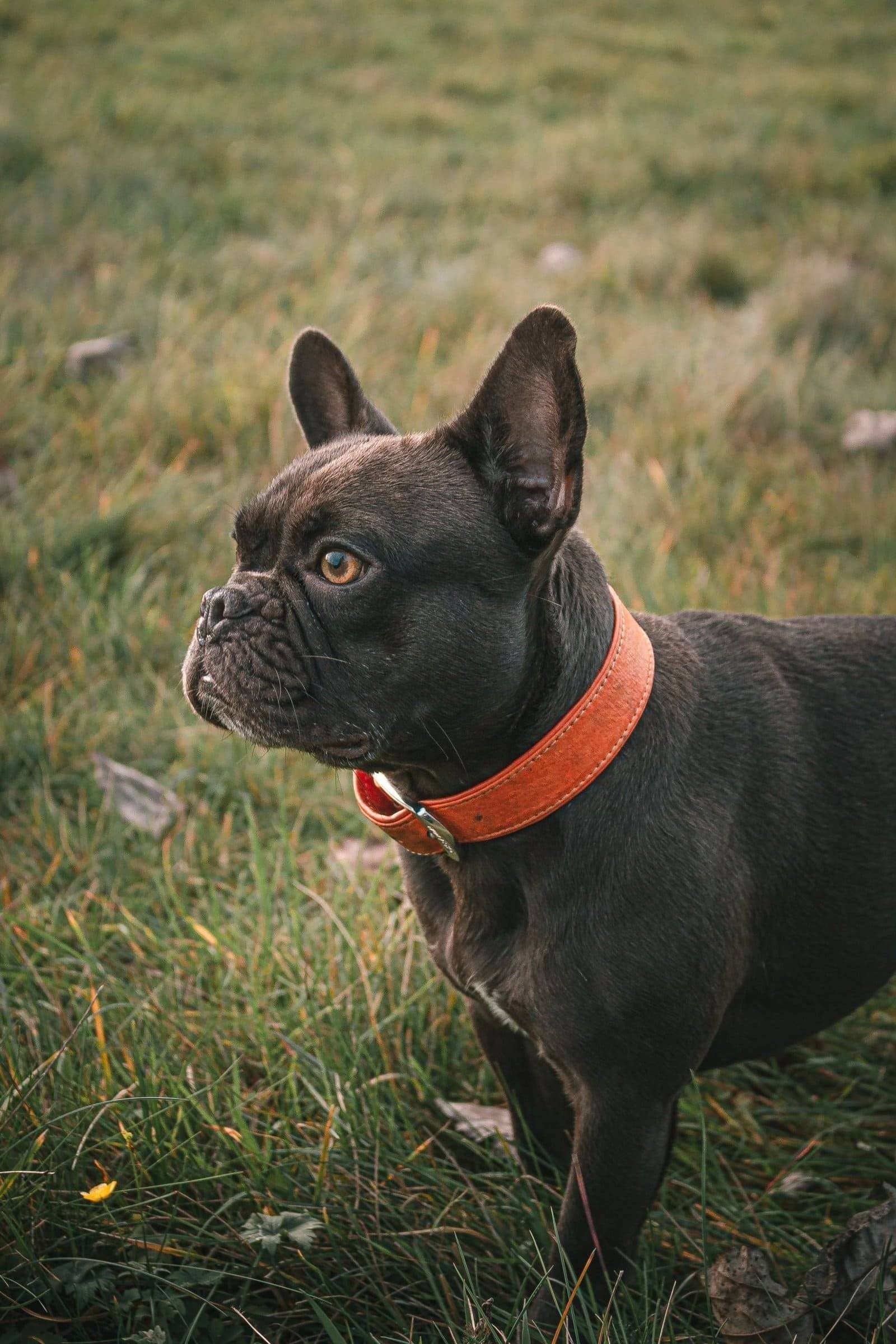New Owner FAQs
- What occurs in the first 9 weeks of my Frenchie’s life before he/she is turned over to me?
What occurs in the first 9 weeks of my Frenchie’s life before he/she is turned over to me?
For the first several weeks, Frenchie puppies sleep about 90% of the time and nurse or scoot around to find mom in order to try to nurse the other 10%. New born puppies are very helpless. They are born blind and deaf and unable to regulate their body temperatures, so we have to use an external heat source when the puppies are not in direct contact with mom. During this time period, their mothers have to stimulate them in order for them to urinate and have bowel movements. While some mothers take to this very naturally, others don’t enjoy this as much and so we have to stimulate their puppies with damp, warm cotton balls.
This is a very busy time for us (and we are usually very sleep deprived) because we assist the mothers every 3 hours around the clock to make sure that all puppies are latching on well, growing, and being stimulated to urinate and defecate. It is a critical time in which the puppies are so small that an unaware Frenchie mother could accidentally smother one or more of her pups, so we monitor them very closely. (Lacey takes a video of each litter at 3 weeks of age and posts them on our website under New Puppies so that our clients near the top of the list, as well as other clients and prospective clients, can get a early look at them.) New Frenchie puppies start life at around a half pound, and will usually double this weight in the first week and add 3/4 pound to a pound per week over the next several weeks. They continue to gain weight rapidly over the next several months of their lives.

At about 10 days they open their eyes and start discovering the big world around them; actually, they don’t see much more than mom, their litter-mates, and us, but that helps them greatly on their voyage to proper socialization. At two weeks age their ears open and they are able to hear, and another big part of their new world opens up. Prior to this event, about all they do is grunt or mew, but afterward their vocabulary includes yelps, whines, and even little barks.
At three weeks of age the more advanced puppies start taking their first shaky steps; prior to this their basic mode of transportation is basic army crawling. They are now able to urinate and defecate on their own and will move away from their sleeping area to do so. Their only nourishment is still mothers’ milk, although it is during this week that they start getting their little teeth. They are starting to get more active as they discover their new abilities to get around, although most of their time is still spent sleeping in their kennel/playpen.
Up to this point it is strictly the mothers and us (Donna, Lacey, and Bick) who have handled the pups (with lots of hand sanitizing before and after) and they have been kept in their kennel. Even though it is hard on the kids, we do not let them or their friends handle them until 4 weeks of age. At four weeks we start introducing them to solid food (initially crushed and moistened). The mothers’ milk also decreases, and they naturally start wanting to decrease the length and frequency of nursing (in large part by instinct, although those sharp little teeth probably play a big factor as well). By the end of the 4th week they are eating their crushed puppy food, with no water added, three times a day. Because they are not nursing as long or as often, we provide fresh water for them at all times. They are walking like champs at this age and are even trotting/running. The kids are allowed to hold them now (closely monitored and with clean hands) and we allow the puppies to run around and explore our large main room in the house.
At 5 weeks of age they are starting to run around all over the place when they are let out to play, and, when they are in their kennels, they play (sometimes rather roughly) with litter mates. It is during this time when some of their adult personalities will start coming out. By the end of this week their puppy teeth are all in, and they love to chew on things, including fingers if you let them. However, even at this age, they will spend most of their time sleeping, probably close to 20 hours per day, with only short times between naps when they are alert and active.
By the end of the 6th week they are completely weaned from their moms and eating solid food well. We frequently take them out of their kennels to scamper around. They are full of energy and love to play with their litter-mates and the kids. This is the time that we really focus on socializing them and we even start their paper training. When they are not being held, played with, or having playtime around the room they are kept in their kennels/play pens and they sleep most of the time, probably still up to 20 hours per day.
By 7 weeks they have already passed through most of their puppy milestones and are continuing to grow rapidly; they are generally in the 4 to 6 pound range. This is when their personalities really start coming out! It is so fun to watch them play with the kids and their litter-mates and observe their new fascination with toys. They have become somewhat accustomed to going potty on pee pads so that when they are out running around the room they often recognize them on the floor and will go potty on them. Though they are fast, active, playful little puppies at this point in their lives, they still are like babies and require lots of sleep (probably over 18 hours per day) and are still quite fragile.
Starting at 6 weeks, we start FORMALLY reserving the puppies from each litter. Before we do, we take each litter into our vet’s office to have each puppy thoroughly examined, and we post a video of each litter on our website. This video will show the color and conformation of each puppy, in addition to its personality.
***All of our puppies are given their first DAPP/C vaccination (5 way) at 6 weeks of age and their 2nd at 9 weeks of age, along with their first Bordetella vaccination. Their their third DAPP and 2nd Bordetella vaccinations are given at 12 weeks (and then a yearly booster thereafter. The rabies shot can also be given at 12 weeks (no later than 16 weeks). They are also regularly de-wormed and given a medication for the prevention of coccidia and giardia.***
At approximately 9 weeks of age our puppies are generally ready to go to their new homes where their socialization and training will continue in earnest. Occasionally we hold onto puppies a little longer if we do not feel they are quite ready to go to their new homes. Our clients are encouraged to come to our home to meet their fur babies if this is feasible. When this is not possible, we arrange for one of our responsible puppy chaperones to hand deliver our puppies to meet their new owners at their nearest major airport. JUST REMEMBER THAT YOUR 9 WEEK OR OLDER PUPPY WILL STILL NEED A LOT OF SLEEP, GENERALLY AT LEAST 16 TO 18 HOURS PER DAY IN A SERIES OF MEDIUM LENGTH TO LONG NAPS. If they don’t get their proper amount of sleep, it can definitely have an impact on their overall health. Part of this sleeping time can certainly be accomplished when they are laying in your lap or next to you on the sofa, but don’t be alarmed when they sleep a lot, because that is what puppies are supposed to do. In fact, even as adults they will sleep at least half of the day in a series of long naps, and probably closer to 14 hours per day.




